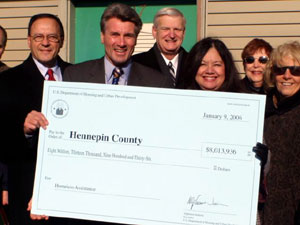|
Photos
More from MPR
|
Minneapolis, Minn. — The $21.5 million in grants is about a half million dollars less than the amount of money awarded last year. HUD officials say the reduction is due to money sent to Hurricane Katrina relief efforts. Since 1995, HUD has distributed funds under the McKinney-Vento Homeless Assistance Act, which is named after the late Rep. Stewart McKinney, R-Connecticut and the late Rep. Bruce Vento, D-Minnesota.
Traditionally the money has gone to programs focused on helping homeless adults with disabilities. But in the past five years, those efforts have been expanded to include families and youth. Dexter Sidney, Minneapolis field office director for HUD, says the grants will fund a wide variety of services for the homeless.
"HUD's funding is provided in two ways," he says. "HUD's 'continuum of care' program provides permanent and transitional housing to homeless persons. In addition, the continuum grants fund the important services including training, health care, mental health, counseling, substance abuse treatment and childcare."
The funds are spread out among 13 districts in the state of Minnesota. The districts are called "continuum of care". The Minneapolis-Hennepin County continuum of care received more than $8 million for 22 programs.
Cathy Ten Broeke, the coordinator of a joint effort against homelessness between Minneapolis and Hennepin County, says the supportive housing facilities that are being funded put homeless people in stable environments that include ready access to vital services.
"In some ways it's simply providing for folks what's missing in their lives: supportive people, supportive services that they don't have access to," she says. "And it's just absolutely just so successful."
"Supportive housing is one of the keys to ending homelessness in this country because it gets people off the shelters and off the streets that we would not be able to get off the streets and out of the shelters otherwise," she said.
One of the supportive housing facilities that received funds from HUD is Camden Apartments. Right now the Camden Apartments is still the Camden Motel, an old motor lodge in north Minneapolis. It will soon be razed to make way for the new building which will become home for homeless men with children.
Will Wallace, the program director for Camden Apartments, says the new facility will create an atmosphere that will make it easier for homeless men to build relationships with their children while they get help overcoming the barriers that make it hard to escape poverty.
"Some of the dads that I've dealt with in the past have been around fathers {who are} not being able to get jobs because of criminal records," says Wallace. "Some fathers have been using chemicals -- and these are hard issues. And just how to raise their kids. Those are the issues they face and I'm there to help them understand there is hope."
The HUD funds include about $2.5 million for emergency shelters. The city of Minneapolis recently passed an ordinance allowing adult shelters to stay open 24 hours, but it was passed with no funding.
The HUD funds will not be used for keeping the shelters open around the clock.





